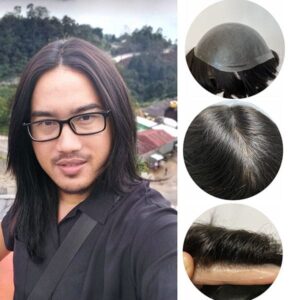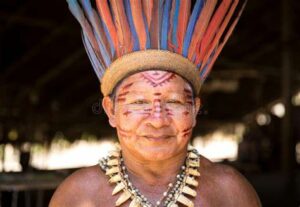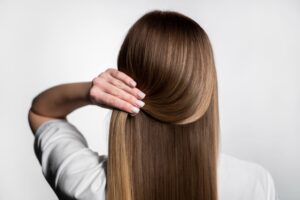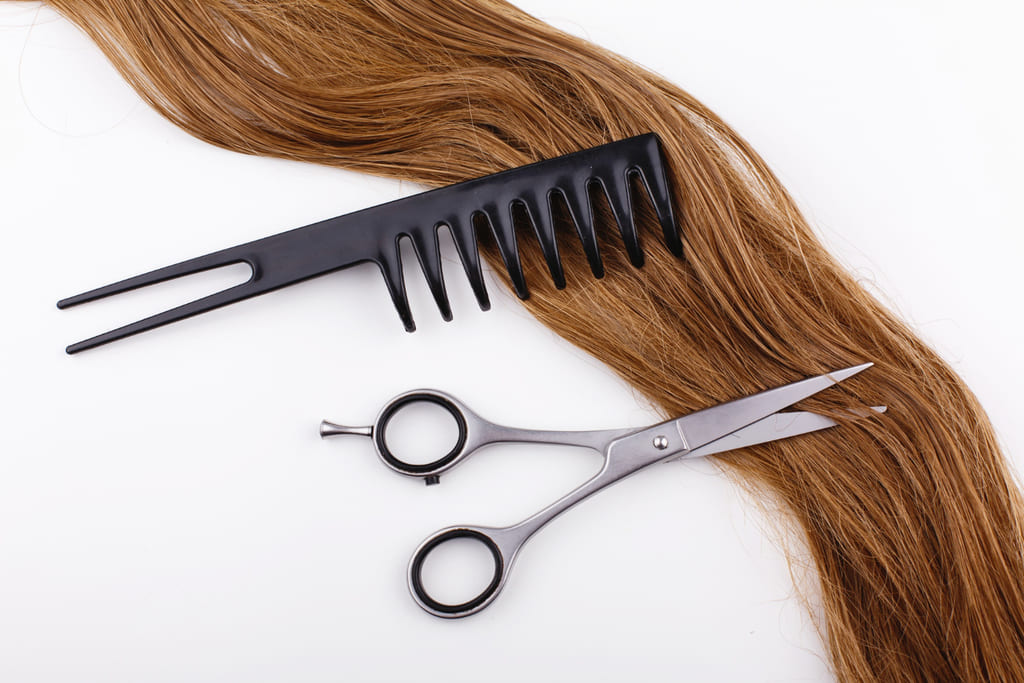
Can dehydration cause hair loss? If so, how to avoid it?
Have you ever seen our catalogue?
Can dehydration cause hair loss? If so, can this be avoided? What should we do to have strong, healthy and beautiful hair? For this, it is essential to keep our body always well hydrated, drinking plenty of water. In fact, water helps the body to purify itself, eliminating waste and toxins, and allows our hair to stay young for longer.
Water nourishes the hair throughout its length, from root to tip, regenerates the scalp, hydrates the tissues, stimulates the follicles and contributes to their growth. In practice, it is a panacea for our hair, an elixir of long youth for full and shiny hair. What’s more, it’s not enough to use quality products or go to the hairdresser to show off first-class hair, but you have to absolutely pamper it with water.
Drinking the right amount of water is especially important in winter, when low temperatures put pressure on the roots. But it is also important in the change of season or in the phases of periodic hair loss, where it is essential to hydrate properly to prevent the hair from weakening and falling out.
At this point you may be wondering, how does water act on the scalp? What beneficial properties does water have? How much liquid do we need to drink to have lush hair? What are the unwanted effects of dehydration on hair? And what can we do to repair the damage caused by poor hydration?
Do not despair, because there are simple methods to recognize the signs of dehydration and good practices to follow with which to get the hair of a movie star. In this sense, it is advisable to drink at least two liters of water a day, massage the scalp and use non-aggressive products to moisturize the ends.
This is a great remedy, so let’s see together how dehydration can lead to hair thinning and loss, as well as tips to prevent and treat this hair problem.
What are the properties of water and what effects does it have on hair?
Let’s face it, we are made of water. Specifically, the human body is made up of an average of 70% water but, in addition, it requires additional and constant contributions every day to function. Just like plants, our bodies also need extra fluids, in particular 10% water in order to function at full capacity, while hair needs up to 17%.
This is the minimum percentage of hydration necessary to achieve water balance and, consequently, have a healthy life and hair.
We use part of the water necessary for hair development through washing and products used for care and styling, such as shampoos, conditioners and lotions. These products actually contain a small percentage of H2O that is indirectly absorbed by the hair. But that is not enough, since the largest intake of water must necessarily come from a glass. And it is that not only do we properly hydrate our hair by drinking, but we also keep the roots and scalp sufficiently nourished.
Like the skin, water acts on all parts of the hair, from the ends to the roots, passing through the cortex, the medulla and the cuticles, ensuring uniform hydration not only on the surface, but also in depth. Each of its constituent elements contributes to the well-being of the hair, performing a different specific action. In short, the mineral salts have an antioxidant effect while the vitamins take care of the external appearance of the hair, guaranteeing its beauty and colour.
Specifically, the copper, zinc and iron present in a concentrated form in the water, penetrate inside the tissues, reaching the marrow, feeding, strengthening and nourishing them. It is thanks to these microelements that the hair can grow long and thick, resisting pollution and atmospheric agents, despite all this being healthy and beautiful.
Calcium and magnesium, meanwhile, combine with each other and make hair strong and powerful, while sodium has a strong anti-inflammatory and antiseptic power, which manages to protect and soothe the skin in cases of sensitive or irritated hair.
While the mineral salts present in the water take care of the health of the hair, the vitamins act on the aesthetic aspect. They achieve shiny hair, preserving its volume and density, keeping the color alive, promoting proper growth and contributing to regrowth. In particular, the B vitamins intervene in the hair follicles, regulating their metabolism, stimulating the production of keratin and therefore growth, finally strengthening the stem.
Therefore, we can conclude by saying that water is essential for the life of our hair, to keep it strong, to prevent premature hair loss and to prevent thinning. Despite the continuous progress of medical science and hair lab research, there is no element healthier than water for our hair.
But there is more. Water is also a valuable ally in mitigating frizz caused by overly aggressive treatments, unsuitable products, or frequent and violent drying or straightening.

Proper hydration, in fact, helps to neutralize the damage caused by chemical products and restore the correct hydrolipidic balance, restoring lost shine and vigor to the tissues. In short, water is the most important beauty routine for our hair, a beauty therapy practically free of charge, and drinking it cures and pampers our hair at the same time.
Why is it important to stay hydrated?
Staying hydrated is the only weapon at our disposal to prevent hair loss or thinning. Scalp dehydration is, in fact, the main cause of more serious diseases such as trichoptilosis, baldness and alopecia. Water plays an essential role for the whole body, but particularly for the hair, as a natural regulator of the hair’s life cycle.
In practice, the water provides the bulb with the necessary nutrients for its correct development, accompanies it from birth on the scalp, guarantees the integrity of the hair without dividing it into double and triple ends and regenerates the follicles naturally. There are four beneficial effects of water. The detoxifying effect, regeneration effect, antioxidant effect and anti-inflammatory effect. Drinking a lot helps us stay young, eliminates waste, impurities, bacteria and germs, purifies us, allows us to fight infections, in the body and in the hair.
Staying hydrated is important at any age, it’s never too early to start drinking the right amount of water. In babies. In fact, the hydrolipidic balance of the hair is precise so that they grow with beautiful thick hair. Moreover, in children and even adolescence, water becomes essential for the correct development of hair, while in other age groups, until old age, water intervenes to ensure the survival of the hair and protect it from pollution, wear, the passage of time and aging.
Lastly, not even gender or hair length affect this beauty routine. Whether you’re a man or a woman, whether you have a zero cut, a short bob or long, back-length curls, proper hydration is a health and beauty imperative that applies to everyone.
How to hydrate properly?
The need for water to drink to keep your hair and skin always at its best is very subjective and varies from person to person. In general, the need for water depends on the weight, age, sex, eating habits, lifestyle of each one of us and finally, although to a lesser extent, also on the temperatures of the city in which we live. They are individual variables that do not allow us to generalize but, nevertheless, there is an approximate table that indicates how much water we should drink to stay hydrated and prevent hair loss.
It all depends on age and gender. Each season of our hair’s life requires a specific amount of water. In babies, in the age group between 0 and six months, water comes mainly from breast milk, but an extra 200 milliliters are needed for each kilogram of body weight. Only then can the baby leave behind the fluff of birth and replace it with real hair, developing healthy and strong strands. In older children, between six and twelve months of age, hair grows and thirst also increases, so they need a liter of water a day to have a correct capillary water balance.
Over time, for children up to two years old, add another 200 milliliters of water, up to one and a half liters of water per day for children four to eight years old. The amounts nearly doubled around adolescence. For boys aged nine to thirteen the required amount is 2.1 liters per day while for girls 1.9 liters per day is sufficient. Finally, there is the chapter on hydration for adults. Men need 2.5 liters of water a day from the age of 14, while women, in consideration of a generally lower weight of the organs, can drink two liters a day.

As for the type of water to drink, we recommend waters low in sodium and with low fixed residues, rich in calcium and magnesium, which better favor diuresis and contribute to digestion, accelerating cellular metabolism and the process of eliminating waste and toxins. that accumulate both in the organs and in the roots of the hair.
If you want perfect hair, the water should be distributed more or less evenly throughout the day, from when you get up to when you go to bed. In the morning, to enhance the detox effect, you can add fruits and vegetables to a simple glass of water, a courtesy that many spas and wellness centers reserve for clients. A splash of orange, the zest of a lemon or a slice of cucumber. It will guarantee you an antiseptic and anti-inflammatory action and will make you start the day in the best way and your hair will surely thank you.
Same philosophy for the night. After a stressful day for our hair, a pleasant light combing with a soft brush, a scalp massage and a glass of water at room temperature become sleep allies. But the water that our hair needs also comes from food, about 30% of the total requirement comes from the dishes we eat. To complete hair care and keep it sufficiently hydrated, we can choose foods rich in water, such as fruits and vegetables, herbal drinks, teas, fruit juices and infusions. Avoid foods high in saturated fat and accompany meals with a good drink. In this way we will take another half liter of extra water but in a different format, equally precious for the health of the hair.
Finally, it must be said that proper hydration is a good health and beauty practice for our hair. On the contrary, an excess of water can be harmful. In this case we find abnormal sweating that leads to a dangerous drop in moisture and salt levels in the blood. The skin begins to ooze as the hair becomes oily and bristly and there is also a risk of losing it or seeing it thin, just like in cases of dehydration.
So let’s remember that virtue is in the middle, even for the hairstyle. Following these tips, drinking the right amount of water and staying hydrated over time helps us fight abnormal hair loss and deal with premature thinning.
Dehydration and hair loss: how are they related?
Dehydration and hair loss are directly related phenomena, one is the cause, the other the consequence. In practice, if the hair is dehydrated, sooner or later it will end up falling out. The lack of water, especially if it is prolonged, dries out the hair, depriving it of its nutrition, and that is because the lack of vitamins, mineral salts, calcium and magnesium that the roots extract from the water, will cause the hair to begin to wither, like a plant that is not watered in must.
The dryness of the bulbs will produce a brittle effect. The hair thins because it no longer has the energy it needs to grow, it splits at the ends giving rise to double or triple ends and finally dies, falling out. It is the life cycle of the capillaries that is abruptly interrupted by the absence of nutrients. This phenomenon can only be stopped by replenishing the water content.
Dehydration is also linked to thinning hair. When the roots dry out due to lack of water, the hair tends to die and the same fate will affect entire strands, hence the correlation between water scarcity and the appearance of galloping alopecia.
It is clear that hydration is extremely common in summer when high temperatures, direct exposure to sunlight and the drying action of sea salt contribute to the evaporation of water from the hair. Therefore, hydration in these months is vital, although it is also essential to have well-hydrated hair in winter, otherwise there may be very serious consequences. For this reason, it is useful to complement the hair routine with extra moisturizing products and moisturize more, especially if the hair is long.
How to recognize the signs of dehydration?
Fortunately, before the situation gets completely worse and the damage is irreparable, our hair sends us signals for help. Correctly interpreting these alarm signals and being able to intervene in time is essential to avoid thinning, falling or even total loss of foliage.
The symptoms of dehydration are easy to recognize, they are easily identifiable physical signs, observable even with the naked eye, it is impossible to go wrong. It is enough to look at the hair in the mirror with a little attention to notice everything that is wrong. Among the signs of a hydrolipidic imbalance we find gray hair, weak or thinned stem, dull roots, double or triple ends, burnt ends that turn yellowish, dandruff, dry scalp accompanied by an annoying sensation of itching and flaking in most cases.
To recognize the signs of dehydration, expensive laboratory tests or microscopic trichological analysis are not needed, it is enough to analyze the hair in its length, observing its tips, roots, thickness, color, density. It is important to observe the hair at two specific times to determine the exact state of health. The first of them is wet, after shampooing, when the hair is still slightly damp, and immediately after drying. In this way you can accurately assess what health conditions you are in and what is the extent of the damage caused by dehydration. Let us now learn together to recognize the signs of lack of water.
Grey hair
Gray hair is defined when it has a dull appearance, regardless of biological age and color tone, natural or dyed. Hair is considered gray if the color no longer reacts to stimuli from sunlight. Hair, in other words, is dark, dull, and pale even when illuminated by the sun’s rays.
It is the lack of water that determines this dull and unhealthy appearance of the hair. The brilliance of the tips is a true litmus test. As soon as hair loses its shine, you should conclude that you are drinking too little water and intervene by drinking more and perhaps integrating hydrolipid levels with specific vitamin supplements.
Dull roots
The speech of the gray hair in the lengths also applies to the roots. If they are dull, colorless, with little or no pigmentation, then you are in a phase of severe dehydration and may face hair loss, thinning and loss of strands. Like the skin, the roots must also be nourished and hydrated to ensure regular and constant growth.
Water provides the roots with the nutrients and vitamins necessary for their development and, in the absence of a hydrolipidic balance, the roots are the first to suffer. showing dullness and dryness. Also in this case, correct hydration can reverse course and make our hair bright and shiny again.
Weak stem
Another danger sign that confirms that our hair is dehydrated is the weak or thinned stem, and the brittle effect is notorious, since the cuticles are stressed by the lack of water, mineral salts, vitamins and nutrients, they lose strength and force and end up breaking.
You’ll be able to see entire strands of clean hair come off with the first pass. If this happens, then you are severely dehydrated. The weak stem is a very worrying sign. The risk is not only that the hair stops growing or, in the most serious cases, falls out, but that the damage spreads to the follicles and also affects the skin and scalp. In these cases, it is necessary to act with specific pharmacological products that restore the hydrolipidic balance as soon as possible, returning all the vitamin elements it needs to the hair.
Double or triple tips
Again, among the effects caused by dehydration of the hair is the appearance of double or triple ends. What we all think of as just a minor inconvenience is actually also a pretty serious medical condition. In medical jargon it is trichoptilosis and it is that phenomenon in which the stem, now dry, shows an abnormal growth and splits at the tip, generating what are commonly called split ends.
Hair affected by trichoptilosis due to dehydration splits into two, sometimes even three parts and stops growing. If it is not treated with specific products, sooner or later they will fall out and in their place there will be no new ones, but sad areas of the hair, leaving a completely hairless head due to alopecia.
Dry scalp
If the hair is dehydrated, in the long run the scalp and the skin of the head will also suffer the same fate. A dry scalp is a very clear sign of dehydration and also indicates that the lack of water is severe and has been going on for a long time.
Very often, the symptom is accompanied and/or preceded by an annoying itching of the hairline. The fibers become rough and painful to the point of making us scratch our heads for relief, and often violent scratching also causes small superficial abrasions on the skin. If the dehydration of the hair persists and we do not act in time by adopting the correct behaviors, the extreme consequences for our hair will be the appearance of dandruff, the historical enemy of the hair, and flaking, a very difficult to cure disorder that consists of the division from the skin of the hair into purulent scales.
Prevent hair loss due to dehydration
Hair dehydration can and should be prevented to avoid the danger of hair loss or even baldness. A dry scalp can actually weaken tissues and lead to cell death. Prevention in the field of trichology exists and is very simple to practice. It is enough to observe a few basic rules and, if genetics allow it, hair loss will no longer be a problem. Hydration is the first commandment, and drinking two liters of water a day is essential for both the health of the hair and the beauty of the skin.
Proper hydration goes hand in hand with a healthy diet. The body is a temple to preserve if we want to keep it healthy. Foods rich in water and fiber, fruits, vegetables together with an adequate amount of fish and white meat constitute a natural prevention of baldness. The vitamins contained in these foods nourish the follicles in depth, nourish the medulla and stimulate the production of keratin, working on the strength of the hair.
Another good daily practice is scalp massage. The hair, like the skin, suffers the aggressive action of pollution, atmospheric agents, aggressive hairstyles and chemical products, so massage helps us keep them healthy. Just like a spa treatment for the face and body, the hair should also be stimulated with manipulations.
Five minutes at night, before going to sleep, is enough to reactivate circulation and cellular oxygenation. Start at the root and make small rotational movements, using your fingertips gently. With your fingertips, repeat the gesture over and over again, until you are completely relaxed.
To facilitate the massage and further hydrate the skin of the scalp, you can also use essential oils such as lavender and rosemary or simple extra virgin olive oil. It is important that they are natural products, made with organic ingredients, dermatologically tested and used to make the skin of the head softer, hydrated and brighter.
In addition, to prevent hair loss and avoid dehydration, you can use specific products such as food supplements, multivitamins, sprays, lotions, shampoos and conditioners, and serums from a moisturizing cosmetic line. Let’s start with food supplements. These are multivitamin pills, tablets to swallow that contain vitamins, trace elements, nutrients and mineral salts that water naturally provides.

From middle age, especially in women and especially in periods of great stress such as changes in temperature or the coldest months, it is useful to take the help of specific food supplements for hair. They replenish mineral salts lost through sweat, cope with seasonal hair loss and provide additional vitamins that promote the production of new keratin. Another panacea to prevent baldness is the capillary activator. It is a hydrogen-based anti-loss vial that regulates the hair’s life cycle, returning it to normal when there is an ongoing hormonal imbalance.
It should be used as prevention during the summer season, when salt and sun attack the tips and burn them. One ampoule per week is enough for a shock treatment. The capillary activator must be applied directly to the scalp, on dry or slightly damp hair, performing a light massage, distributing it throughout the scalp, so that the product penetrates evenly throughout the head. In this way, the release will be gradual, with guaranteed results from the first applications.
Revitalizing sprays, lotions and serums are also very effective. They are an intensive treatment that should be carried out only once a year and contain creatine and carnitine, two molecules that, combined with each other, provide excess energy to the follicles and strengthen the roots, thus helping to slow down the hair thinning process by dehydration, a process that usually also leads to weight loss and therefore to baldness. In addition to good habits, to keep hair hydrated there are also a couple of bad habits that should be abandoned from an early age.
Among the things that should not be done to avoid hair dehydration and hair loss are smoking, alcohol abuse or junk food abuse, as they dry out the skin of the head and prevent the growth of new hair, going to delay or completely block the life cycle of the follicles. Even the use of aggressive hairsprays, gels that are too heavy, or fixing and styling products, that affect the health of the hair. Less is more, better to use few but good treatments, than to abound in creams and ointments that are not suitable for our hair type.
To determine which products are the right ones, you can consult specialized hairdressers and stylists such as the experts at NewLacecu who, by studying clients’ hair and analyzing their needs, are able to understand their needs. Finally, let’s talk about hygiene practices, since too frequent or incorrect washing can dry out the skin and produce the same harmful effects of dehydration.
It may seem like a paradox, but too much water, especially if it lasts over time, has harmful consequences for the hair. The ideal is to wash with shampoo every three days, to clean and nourish the roots and favor the oxygenation process of the tissues. For oily hair, washes should be much less frequent, about once a week, and should include the use of water-based astringent products. For dry hair we recommend a shampoo every two days and finally, for wavy, curly or very curly hair, which accumulates sebum more slowly and progressively, even one every seven days is enough.
How to cure hair loss due to dehydration?
Hair loss treatments are divided into three types. There are herbal treatments, hormonal treatments and drug treatments. The first group of dehydration therapies includes supplements, multivitamins, lotions, ampoules, creams and, in general, all those cosmetic products based on vitamins and mineral salts that provide the hair with the nutrition lost due to lack of water.
They are very widespread and productive therapies, which can help us recover thick hair but not definitively, since they treat the disease without eradicating it. Among the most incisive treatments are hormonal treatments. Based on estrogens, testosterone and somatotropic hormones, they promise to awaken the natural production of keratin, produce new hair and stop the fall of old ones.
Also in this case it is only a palliative, not a definitive cure. The injection of hormones will make up for the immunological deficit, but without completely overcoming the triggering problem. Finally, there are pharmacological remedies with a whole range of anti-loss products. Sebum regulators, capillary activators in tablet or foam form, vials and lotions containing finasteride and minoxidil, two molecules that perform important anti-inflammatory, antiseptic and immunosuppressive functions. In practice, they are anti-aging for hair and should be used as prevention rather than shock therapy.
How to treat hair loss from dehydration
If the advice that we have given you so far has not been useful and the level of dehydration of your hair has reached a point of no return, with copious loss of strands and the appearance of the first signs of baldness, then prevention does not work anymore.
In these cases, for the treatment of hair loss you will necessarily have to contact professionals in the sector and start evaluating more definitive and serious solutions.
In the range of treatments for baldness and alopecia there are extensions, hair patches, partial or total prostheses and wigs, two very different but equally effective, long-lasting and stable measures that can restore the security that you have lost along with hair loss.
Let’s start with the wigs. Currently there are many medical centers that deal with designing and creating beautiful and at the same time functional hair implants that definitively solve the problem of hair loss. For example, the experts at NewLacecu provide next-generation wigs of the highest quality at very competitive prices. You can choose between synthetic wigs or real or simple extensions to cover the areas affected by alopecia in a timely and systematic way.
Each system is tailor-made for the client, respecting the natural color of the hair, the cut and the hairstyle, satisfying all their needs. It is not only a matter of appearance, but also of psychological well-being. NewLacecu also supplies hair maintenance products for all of our trichological prostheses so that implants and wigs always look in their best condition. You can contact us through our contact form, where you can request a free consultation.
A team of hairdressers, stylists and trichology specialists will help and guide you in choosing the most appropriate solution for your case, making sure that the problem of hair loss is solved forever. There is a remedy for baldness and it is NewLacecu.
Difference between implants, hair patches and wigs
Among the various hair systems there are several models. There are prosthetics, extensions, partial or full skin patches, real or synthetic wigs, as well as a wide range of thickening systems. Each of these devices is designed to compensate for a specific disorder, whether it is alopecia, thinning or baldness, implants are the most effective and long-lasting measure. Let’s look at the differences between the various models.
Prostheses are hair implants that are applied to a part of the scalp affected by alopecia or to the entire head, covering it. Newlacecu designs and manufactures personalized prostheses for the client starting from the membrane, a very thin film that adheres to the skin and on which the hair will then be inserted.
They are authentic leather patches, enriched with synthetic fur or natural fur, destined to last forever. With Newlacecu’s trichological implants you will once again have a mane of envy. Instead, wigs are external and mobile systems. Newlaecu’s are of the highest quality, with fine workmanship but at competitive prices.
You can choose color, tone, cut, hairstyle and also choose to order products for the maintenance of your system. Newlacecu supplies complete trichological systems, the result of laboratory research and in-depth studies of materials.

Xiufei Wu
Xiufei Wu is an expert in hair restoration and has been working in this field for more than 20 years. She has an engineering degree from Qingdao University of Science and Technology with honors (1998). In the year 2000 he began working on the creation and commercialization of hair prostheses and wigs and then in 2005 he founded his personal company New lacecu wig co, which today has hundreds of companies (hairdressers and wig shops) among its clients and thousands of private customers. She today is considered one of the leading experts in China in the manufacture and marketing of hair prostheses and wigs.
Lascia un commento
About us
NewLacecu is an italian owned business located in China. Launched in 1995, we have been committed to providing our customers with the best lace wig and hair pieces at affordable prices. All our products are handmade with the highest quality human hair, 100% certified.
Our mission is to bring our customers the highest quality in human hair replacement systems. We only use the best materials in the market and we ensure quality control by constantly developing and using strict methods at every single step of hair pieces manufacture.





